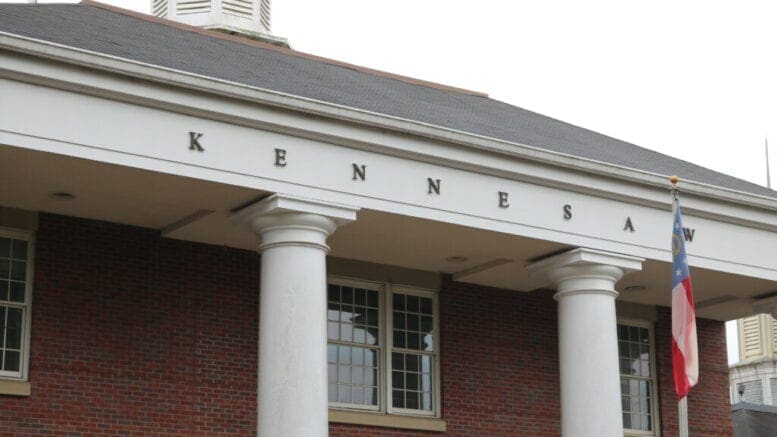A possible change to Kennesaw’s alcohol ordinance could make the entertainment district a whole lot more entertaining.
The proposed change would allow businesses that don’t currently qualify for an alcohol pouring license to apply, as long as they are located in the entertainment district of downtown Kennesaw. Council members also hope it will draw a more diverse mix of businesses.
The entertainment district was approved by Kennesaw City Council in January 2019. It encompasses several blocks along Main, Cherokee, Summer and Dallas Streets, including the Schoolhouse Village mixed-use development, Depot Park, Revival, and continues past the Southern Museum. Visitors are allowed to purchase alcoholic beverages and carry them around within the borders. A map of the district can be found here.
The amendment, which has been under discussion by the council for several months, would allow businesses that do not serve food to apply for a license to sell by the drink. Some of the examples previously discussed in council meetings included art galleries that wish to sell wine by the glass, music venues, comedy clubs, arcades, and the latest recreational trend – axe throwing.
During Monday’s work session, much of the discussion revolved around the percentage of alcohol sales to be permitted in such retail establishments. As the code currently stands, a restaurant is required to derive 50 percent of its income, and a bar 25 percent, from food in order to sell alcohol. Council members Tracey Viars and Chris Henderson supported higher percentages of allowable alcohol sales, with Henderson requesting retail and entertainment establishments be allowed at least 50 percent of their income to be derived from alcohol, and Viars suggesting as much as 75 percent.
Councilman Doc Eaton said he was also fine with the 50 percent cap, but members David Blinkhorn and Pat Ferris both pushed to cap the total at 25-30 percent, saying it’s supposed to be an amenity, not the primary focus of the business.
“We have an entertainment zone so that people could literally walk in any of these places that serve alcohol and take a drink to go. There’s going to be some of those kinds of sales that don’t correlate to buying food, or buying a service, or throwing axes, or anything else. I just don’t want to handicap small businesses that might be in a high rent district to what they can do, especially if you’re in a business that’s the kind of business that people drink a beer while they do it,” Viars said.
Viars illustrated her concern using the example of a cigar bar.
“We go in a cigar bar and we each buy a $10 cigar and we each have one beer. The next drink we will be over their limit in that particular transaction,” she said.
“But then aren’t you a bar that sells cigars?” Mayor Derek Easterling pointed out.
“There’s our problem,” Henderson said, in reference to the requirement that a bar have food service. “What does the food service part get us? We have manufacturers who can sell liquor and beer with no food service whatsoever. They’re allowed to do that. Why do we restrict all the rest of the businesses to some completely different standard, when the manufacturers are able to do that?”
Henderson suggested creating a separate bar ordinance to cover establishments such as comedy clubs and music venues. Ferris agreed with the suggestion, though he made it clear he was not very enthusiastic about the topic.
“I think this whole exercise is ridiculous…I’m of the opinion that we don’t have to have alcohol in every business and every place in this city,” he said.
Easterling tasked Attorney Sam Hensley with updating the language of the ordinance to allow retail businesses to earn up to 50 percent of their revenue from alcohol. It will return to the council for further discussion at a later date. Such businesses would not be able to sell alcohol on Sundays as that is governed by the state and requires a food service component.
Kennesaw’s annual fee to pour liquor is $3,000. A beer license is $550. Wine is also $550. To have a full bar, a business must pay a total of $4,100 in annual fees.

Rebecca Gaunt earned a degree in journalism from the University of Georgia and a master’s degree in education from Oglethorpe University. After teaching elementary school for several years, she returned to writing. She lives in Marietta with her husband, son, two cats, and a dog. In her spare time, she loves to read, binge Netflix and travel.

As a former 20 yr resident. There is a reason Kennesaw is a dying city. First the old Guard land locked the city. Then you still have the do gooders imposing their beliefs upon citizens. Look at Acworth, Woodstock and even Cartersville & Rome. They are growing, biggest boost Kennesaw has seen is college kids and Katrina evacuees that stayed. Ask the PD how that’s working. Citizens, vote to turn in the city charter and quit paying taxes for a bunch of “morale hypocrites” that do not serve the community!
Yes alcohol and building on every piece of available land is more important than the historical cemetery which will be surrounded by businesses and hidden by bldgs. Where is the dignity that this town use to have.
Yes alcohol and building on every piece of available land is more important than the historical cemetery which will be surrounded by businesses and hidden by bldgs. Where is the dignity that this town use to have.